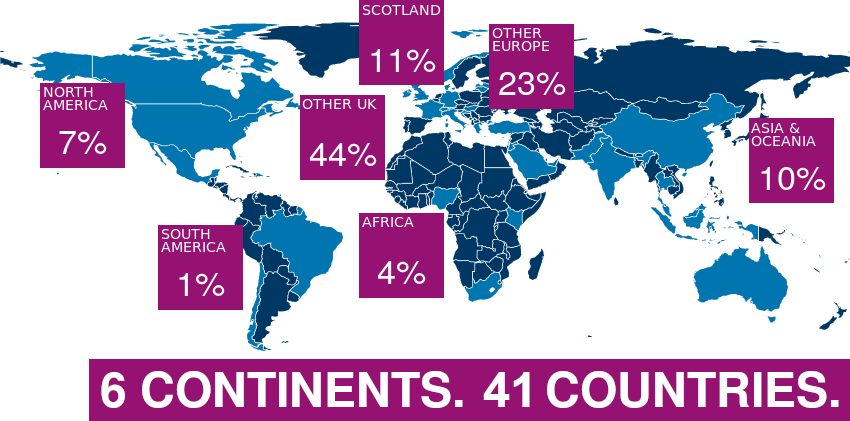Data Analytics MSc/PgDip/PgCert: Online distance learning

Postgraduate online event:
Thursday 8 May 2025, 9am – 5pm
Chat to staff, students and academics to discover what it's like to study at our world changing campus as a postgraduate student at UofG
While the amount of data being produced is proliferating at a staggering rate, the skills to extract information and the value we receive from it are both relatively scarce. If you are looking to start a career in data science, or even further your current career, our Online Data Analytics MSc will provide you with vital skills required to develop your modelling and data handling expertise. You will gain a firm grounding in the principles of learning from data sets, whilst at the same time getting hands-on experience handling, analysing and visualising data. which will help you to realise your true potential while making you in demand in the modern workplace.
- Online distance learning
- Academic contact: MSc Data Analytics ODL Management Team
- Teaching start: September
- Online
- MSc: 36 or 24 months part‑time
- PgDip: 24 months part‑time
- PgCert: 12 months part‑time
Why this programme
 https://www.youtube.com/watch?v=SZqTaV_OT8k
https://www.youtube.com/watch?v=SZqTaV_OT8k
- The Statistics Group at the University of Glasgow is internationally renowned for its research excellence. Students are able to benefit from this by learning from academics whose expertise covers the analysis of data from a wide range of applications.
- A faster study route, which lets you complete the programme in two years, is also available.
- Designed for part time study, this programme allows you to gain an MSc degree from a leading university while you are still in full-time employment. Plus, from day one you can start to put your new knowledge to the test at work. You won't have to wait until you've graduated to make a real difference in the workplace.
- The Masters in Data Analytics is accredited by the Royal Statistical Society.
- You'll be studying with a Russell Group University
- You will have the freedom to work at your own pace and access to a wide range of learning tools including rich interactive reading material and tutor-led videos. You will also be able to arrange tailored one-to-one sessions with our academic team.
Information sessions
We run regular online information sessions for prospective students to find out more about the programme and ask questions.
You can also view recordings of recent information sessions on YouTube.
Our students
Our students contribute a wealth of professional experience from a variety of sectors including finance, the pharmaceutical industry, banking, IT services and government statistical services amongst others.

Our students come from all over the world, bringing a rich mixture of personal experiences, cultural backgrounds and strong sense of internationalism to our student community. The open and welcoming atmosphere amongst students and staff creates an inspiring yet supportive environment for collaborative learning, and personal and professional growth.
+++
What our students say
Mutono Nyamai (PhD Fellow at University of Nairobi and Washington State University in the Global Health Programme)
"Soon after I enrolled for my PhD, I realized that I needed data analytics skills as I would be dealing with big datasets and modeling of infectious diseases. I needed a course that would teach me the current analysis trends while setting me apart as a great data scientist. The programme is very well structured with very knowledgeable and supportive lecturers who are more than willing to have one-on-one meetings with you to ensure you understand the concepts.This programme has surpassed my expectations in keeping up with the current industry needs, using popular and relevant analysis tools and training me to work in the field of research. Thanks to this course, I can now confidently call myself a data scientist."
Jonas Dieckmann (Data & Advanced Analytics Manager at Philips)
---
Programme structure
This flexible part-time programme is completed over three years. In the first two years, you will take two courses each trimester. In the third year, you will work on a project and Dissertation.
MSc
Choose one from the following:
MSc and PgDip
Core courses:
- Advanced Predictive Models (ODL)
- Data Mining and Machine Learning I: Supervised and Unsupervised Learning (ODL)
- LEARNING FROM DATA (ODL)
- Predictive Modelling (ODL)
- R Programming (ODL)
- Data Analytics in Business and Industry (ODL)
- Data Management and Analytics using SAS (ODL)
- Data Mining and Machine Learning II: Big Data and Unstructured Data (ODL)
- Data Programming in Python (ODL)
- Large-Scale Computing for Data Analytics (ODL)
- Uncertainty Assessment and Bayesian Computation (ODL)
Optional courses:
PgCert
Core courses:
Choose one of the following optional courses:
Choose two from the following:
- Advanced Predictive Models (ODL)
- Data Mining and Machine Learning I: Supervised and Unsupervised Learning (ODL)
- Data Mining and Machine Learning II: Big Data and Unstructured Data (ODL)
Key outcomes
- Demonstrate thorough understanding of the concepts, principles, theories and methods of probability, statistics and machine learning.
- Developing strategies for modelling and analysing potentially large and complex data.
- Communicate and visualise insights gained from data.
- Design and develop software to perform data management, data extraction, statistical analyses and, as far as possible, automate these, using different tools and programming languages such as R, Python, Spark and TensorFlow.
Programme alteration or discontinuation
The University of Glasgow endeavours
to run all programmes as advertised. In exceptional circumstances, however, the University may withdraw
or alter a programme. For more information, please see: Student contract.
Career prospects
Data is becoming an ever increasing part of the modern world, yet the talent to extract information and value from complex data is scarce. There is a massive shortage of data-analytical skills in the workforce. This programme opens up a multitude of career opportunities and/or boosts your career trajectory.
Our graduates have an excellent track record of gaining employment in many sectors including medical research, the pharmaceutical industry, finance and government statistical services, while others have continued to a PhD. Recent graduates have been employed by Lloyds Banking Group, Equifax, Kohler, Moodys and Globality.
Explore our LinkedIn profile for a flavour of where our most recent graduates work.
Fees & funding
Tuition fees for 2025-26
MSc
Online Distance Learning:
UK / EU / International: £15,660 (total cost)
- £1,740 per 20 credits
- 60 credits per year over 3 years
PgDip
Online Distance Learning
UK / EU / International: £10,440 (total cost)
- £1,740 per 20 credits
- 60 credits per year over 2 years
PgCert
Online Distance Learning
UK / EU / International: £5,220 (total cost)
- £1,740 per 20 credits
- 60 credits per year over 1 year
Additional fees
- Fee for re-assessment of a dissertation (PGT programme): £370
- Submission of thesis after deadline lapsed: £350
- Registration/exam only fee: £170
Funding opportunities
UK Study Online Scholarship
The UK Study Online scholarship is open to UK, EU and international students taking online undergraduate and postgraduate courses.
Please see UK Study Online for more details.
University of Glasgow CoSE-UGM Alumni Scholarship
We are delighted to announce a scholarship for graduates of UGM wishing to undertake a masters programme in the College of Science and Engineering.
Postgraduate Loans for Welsh Students
If you are a Welsh student looking to study a postgraduate programme* in Glasgow then you can apply for a student loan in exactly the same way as you would for a Welsh University.
* does not apply to Erasmus Mundus programmes
For more information visit Student Finance Wales
Alumni Discount
In response to the current unprecedented economic climate, the University is offering a 20% discount on all Postgraduate Research and full Postgraduate Taught Masters programmes to its alumni, commencing study in Academic session 2025/26. This includes University of Glasgow graduates and those who have completed a Study Abroad programme, International Summer School programme or the Erasmus Programme at the University of Glasgow. The discount applies to all full-time, part-time and online programmes. This discount can be awarded alongside most University scholarships.
Postgraduate Student Loan (NI)
If you are a Northern Irish student looking to study a taught Masters programme* in Glasgow then you can apply for a student loan in exactly the same way as you would for a University in Northern Ireland.
Northern Irish students are able to apply for non-means-tested tuition fee loans of up to £5,500, to help with the costs of funding.
For more information visit www.studentfinanceni.co.uk/types-of-finance/postgraduate .
* does not apply to Erasmus Mundus programmes
The scholarships above are relevant to this programme. For more funding opportunities search the scholarships database
Entry requirements
2.1 Hons (or non-UK equivalent) in any subject with a substantial mathematics component (at least equivalent to Level-1 courses in Mathematics and Level-2 courses in Calculus and Linear Algebra at the University of Glasgow). Graduates who have A-Level or Higher Mathematics, or equivalent, may also be admitted to the programme.
Graduates who achieved 2.2 Hons (or non-UK equivalent), but who have at least two years of relevant professional experience which involved a significant amount of programming, data management, data analysis or mathematical modelling may also be admitted to the programme. Such applicants may be required to complete an interview.
Previous study of Statistics or Computing Science is not required.
English language requirements
For applicants from non-English speaking countries, as defined by the UK Government, the University sets a minimum English Language proficiency level.
International English Language Testing System (IELTS) Academic and Academic Online (not General Training)
- 6.5 with no subtests under 6.0
- IELTS One Skill Retake Accepted
- Tests must have been taken within 2 years 5 months of start date. Applicants must meet the overall and subtest requirements using a single test.
Common equivalent English language qualifications for entry to this programme
TOEFL (ibt, mybest or athome)
- 90 overall with Reading 20; Listening 19; Speaking 19; Writing 21
- Tests must have been taken within 2 years 5 months of start date. Applicants must meet the overall and subtest requirements, this includes TOEFL mybest.
Pearsons PTE Academic
- 59 with minimum 59 in all subtests
- Tests must have been taken within 2 years 5 months of start date. Applicants must meet the overall and subtest requirements using a single test.
Cambridge Proficiency in English (CPE) and Cambridge Advanced English (CAE)
- 176 overall, no subtest less than 169
- Tests must have been taken within 2 years 5 months of start date. Applicants must meet the overall and subtest requirements using a single test.
Oxford English Test
- 7 overall with no subtest less than 6
- Tests must have been taken within 2 years 5 months of start date. Applicants must meet the overall and subtest requirements using a single test.
LanguageCert Academic SELT
- 70 overall with no subtest less than 60
- Tests must have been taken within 2 years 5 months of start date. Applicants must meet the overall and subtest requirements using a single test.
Password Skills Plus
- 6.5 overall with no subtest less than 6.0
- Tests must have been taken within 2 years 5 months of start date. Applicants must meet the overall and subtest requirements using a single test.
Trinity College Tests
- Integrated Skills in English II & III & IV: ISEII Distinction with Distinction in all sub-tests
- Tests must have been taken within 2 years 5 months of start date. Applicants must meet the overall and subtest requirements using a single test.
University of Glasgow Pre-sessional courses
- Tests are accepted for 2 years following date of successful completion.
Alternatives to English Language qualification
- Degree from majority-English speaking country (as defined by the UKVI including Canada if taught in English)
- students must have studied for a minimum of 2 years at Undergraduate level, or 9 months at Master's level, and must have completed their degree in that majority-English speaking country within the last 6 years.
- Undergraduate 2+2 degrees from majority-English speaking country (as defined by the UKVI including Canada if taught in English)
- students must have completed their final two years study in that majority-English speaking country within the last 6 years.
For international students, the Home Office has confirmed that the University can choose to use these tests to make its own assessment of English language ability for visa applications to degree level programmes. The University is also able to accept UKVI approved Secure English Language Tests (SELT) but we do not require a specific UKVI SELT for degree level programmes. We therefore still accept any of the English tests listed for admission to this programme.
Pre-sessional courses
The University of Glasgow accepts evidence of the required language level from the English for Academic Study Unit Pre-sessional courses. We would strongly encourage you to consider the pre-sessional courses at the University of Glasgow's English for Academic Study (EAS) Unit. Our Pre-sessional courses are the best way to bring your English up to entry level for University study. Our courses give you:
- direct entry to your University programme for successful students (no need to take IELTS)
- essential academic skills to help you study effectively at University
- flexible entry dates so you can join the right course for your level.
For more detail on our pre-sessional courses please see:
We can also consider the pre-sessional courses accredited by the below BALEAP approved institutions to meet the language requirements for admission to our postgraduate taught degrees:
- Heriot Watt
- Kingston Upon Thames
- Middlesex University
- Manchester University
- Reading University
- Edinburgh University
- ST Andrews University
- UCL
- Durham.
For further information about English language requirements, please contact the Recruitment and International Office using our enquiry form
How to apply
To apply for a postgraduate taught degree you must apply online. We cannot accept applications any other way.
Please check you meet the Entry requirements for this programme before you begin your application.
Documents
As part of your online application, you also need to submit the following supporting documents:
- A copy (or copies) of your official degree certificate(s) (if you have already completed your degree)
- A copy (or copies) of your official academic transcript(s), showing full details of subjects studied and grades/marks obtained
- Official English translations of the certificate(s) and transcript(s)
- One reference letter on headed paper
- Evidence of your English language ability (if your first language is not English)
- Any additional documents required for this programme (see Entry requirements for this programme)
- A copy of the photo page of your passport
You have 42 days to submit your application once you begin the process.
You may save and return to your application as many times as you wish to update information, complete sections or upload supporting documents such as your final transcript or your language test.
For more information about submitting documents or other topics related to applying to a postgraduate taught programme, see how to apply for a postgraduate taught degree
Guidance notes for using the online application
These notes are intended to help you complete the online application form accurately; they are also available within the help section of the online application form.
If you experience any difficulties accessing the online application, see Application System Help.
- Name and Date of birth: must appear exactly as they do on your passport. Please take time to check the spelling and lay-out.
- Contact Details: Correspondence address. All contact relevant to your application will be sent to this address including the offer letter(s). If your address changes, please contact us as soon as possible.
- Choice of course: Please select carefully the course you want to study. As your application will be sent to the admissions committee for each course you select it is important to consider at this stage why you are interested in the course and that it is reflected in your application.
- Proposed date of entry: Please state your preferred start date including the month and the year. Taught masters degrees tend to begin in September. Research degrees may start in any month.
- Education and Qualifications: Please complete this section as fully as possible indicating any relevant Higher Education qualifications starting with the most recent. Complete the name of the Institution (s) as it appears on the degree certificate or transcript.
- English Language Proficiency: Please state the date of any English language test taken (or to be taken) and the award date (or expected award date if known).
- Employment and Experience: Please complete this section as fully as possible with all employments relevant to your course. Additional details may be attached in your personal statement/proposal where appropriate.
Reference: Please provide one reference. This should typically be an academic reference but in cases where this is not possible then a reference from a current employer may be accepted instead. Certain programmes, such as the MBA programme, may also accept an employer reference. If you already have a copy of a reference on letter headed paper then please upload this to your application. If you do not already have a reference to upload then please enter your referee’s name and contact details on the online application and we will contact your referee directly.
Related programmes
Online postgraduate

Postgraduate events


